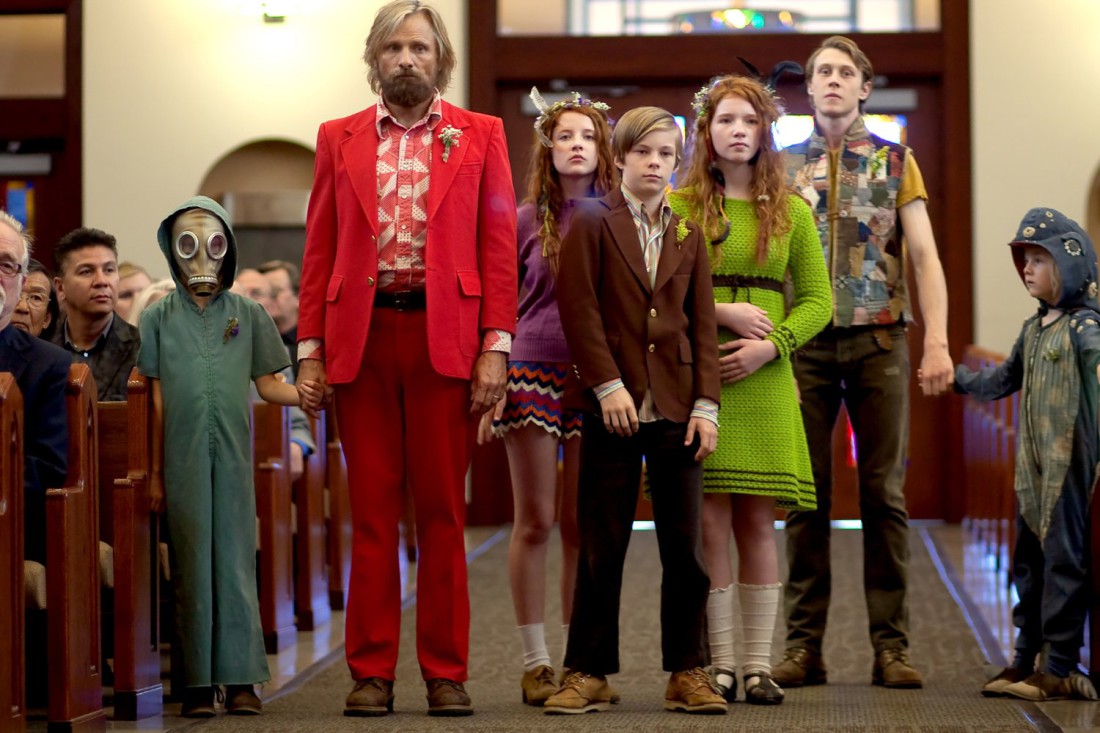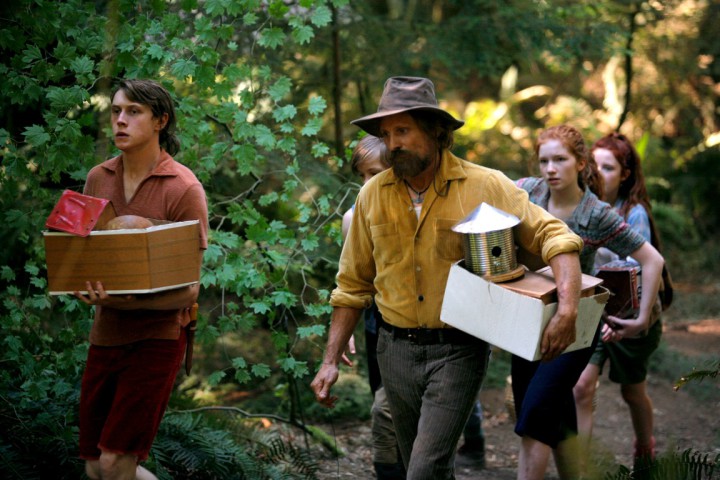As a recovering Ivy Leaguer with quasi-anarchistic political leanings, I should’ve ostensibly found myself squarely within the target audience for Captain Fantastic. Yet, despite the occasional accusation of intellectual elitism leveled at your humble reviewer, even I found this film too sanctimonious for its own good at times. Despite that fact, a clever script and some first-rate performances do a great deal to compensate for the movie’s inflated sense of its own value, resulting in a film as original as it is compelling — albeit one that falls just short of delivering on the promise of its premise. It would be safe to say that my principal complaint about Captain Fantastic is that I wanted to like it more than I ultimately did. That complaint was sufficiently obtrusive in my analysis of the film that it was edged out for my Pick of the Week by Bad Moms, a film I enjoyed more than I expected.
Written and directed by character actor Matt Ross, this movie left me wondering how far from reality his portrayal of pseudo-spiritual blowhard Gavin Belson on HBO’s Silicon Valley might actually be. That said, there is something moving about Ross’ worldview, a utopian vision of benevolent dictatorship in which honesty and integrity always win the day, even if this often feels like wishful thinking. Ross’ script addresses such concerns with a poignant second act that allows his protagonist’s crisis of faith to drag on a bit too long but still manages to imbue the struggle with believability and relatability — at least insofar as those terms can be applied to the story of a highly educated social dropout raising a brood of “philosopher kings” in near-total isolation. Ross intends to portray his characters’ off-the-grid self-sufficiency as a precondition necessary for a sort of postmodern Kallipolis, but Ross is no Plato, and The Republic this ain’t. The greatest deficiency in Ross’ narrative is that it’s so successful in establishing his characters’ superiority over their contextual hoi polloi that it feels more like a cop-out than a catharsis when they inevitably move towards a more rational middle ground.
My quibbles with the script are relatively minor, however, and Captain Fantastic has a tremendous ace up its sleeve in the form of a standout cast. Although the young actors and actresses playing the kids at the center of the story stumble over some of the early dialogue’s elevated tone, by the film’s end they all inhabit their roles with a level of competency and commitment that belies their age. Frank Langella is beautifully cast as Viggo Mortensen’s overbearing bourgeois father-in-law, and his deft transitions between grandfatherly dotage and outright menace are a true testament to his virtuosity. But, as good as the supporting cast is, it’s impossible to imagine Captain Fantastic starring anyone other than Viggo Mortensen, and he carries the film with such admirable aplomb that this role has rightfully earned its place among his finest performances, at least in my book. I can’t readily come up with another actor working today who could carry off a full-frontal scene on the steps of a bus in a trailer park with the same self-assured air. In many instances throughout the film his performance is the only element keeping the proceedings from devolving into self-parody.
Captain Fantastic premiered to positive reviews at Sundance, and that’s to be expected if only because this feels like a film tailored to please precisely such an audience. In essence, this is a movie made in direct response to a world in which Idiocracy feels increasingly like a documentary. To be sure, there is gratification to be had in watching an 8-year-old trounce her mouth-breathing, high school-aged cousins with her superior understanding of the Bill of Rights. But that gratification can only be derived from an inherently smug sense of self-righteousness, and it’s this underlying pomposity that threatens to undermine the film thematically. Those who see some appeal in replacing Christmas with a celebration of secular humanism that substitutes the birth of Christ with that of Noam Chomsky will absolutely love this film, but it’s unlikely to go over well with most filmgoers firmly ensconced in the culture and politics of the Bible Belt. On that basis, if you feel like Captain Fantastic is a film intended for you, then you’re sure to enjoy the ride. All others should wait for the next bus. Rated R for language and brief graphic nudity
Now Playing at Carolina Cinemark








I saw it with only one other person in the audience somewhere behind me, and I’m thinking the fact that we are in South Dakota accounts for this. I enjoyed the movie a lot, finding it touching and funny and even surprising. I loved the literary discussion of “Lolita” that segued into a candid explanation of sex to a curious child, utterly direct and truthful. And I agree that I can’t imagine the movie without Mortensen. When’s this guy going to get an award?
This is, without a doubt, one of the best roles Mortensen has gotten in quite some time. Possibly my favorite since A History of Violence. And as much as I loved this film, I just couldn’t seem to shake the feeling that it was merely very good when it had the chance to be, well, fantastic. Somehow I’m not shocked that audiences in South Dakota aren’t turning out in droves. I suspect that this is the type of film that will play to packed houses in New York and LA, but very few cities in-between.
My expectations have plummetted so far that very good is beginning to seem fantastic. I, too, really liked Mortensen in A History of Violence, which was one of the best movies of the decade, in my view.
Great performances from Steve Zahn and Katharine Hahn, too. I especially liked seeing her acting in a serious role before going back to her usual comedic jam in “Bad Moms”. Frank Langella’s role was interesting: first a presumed villain, then a pretty sympathetic family figure. Excellent music selections, too (Yes, even the bagpipes, you Sassenachs!). So much here to admire.
Loved this film. Even its self-righteousness was entertaining because it was so real– and don’t we all have friends who are insufferable? Definitely on my ten best of the year list.
mm
In no particular order of importance:
— Go ahead and be one of the “Aristoi, Scott”. The city needs that, even in Ivy League versions.
–Yes, the film is too “sanctimonious”. Ideologues of this stamp often are vulnerable to this. But the social satire is sharp in places, as you note.
–You suggest that the Viggo character might be “a benevolent dictator”. Sure, but not always “benevolent”. Revisit the scene on the enormous mountain face. Pure comic book stuff. No intelligent parent, in the service of teaching any virtue, would require his kids (especially the little ones) to attempt this. It was silly.
— A “benevolent dictator” would ask kids to dig up their mother in a cemetery?? And think the law wouldn’t catch up to them on that? And then ask them to watch her burn? This is Wonderland.
— Yes, Viggo was superb, even in the utterly gratuitous and sophomoric scene in which he flaunted his Johnson to the old ladies. Wow! Welcome to Woodstock.
–In the last column, you write about what saves the thing from “devolving into self-parody”. Maybe so. But I think the proposition is arguable. Of course, I’m not a devotee of Noam Chomsky. See the recent Harper’s edition in which a reputable scientist debunks Chomsky’s central ideas about linguistics and asserts that the man is immune to criticism and swims in an ocean of self adulation.
— Interesting borrowings from “Lord of the Flies” in the opening scene with the little deer hunter all mudded up and fierce with a knife. The only problem is that the whole scene is unrealistic nonsense. Never could happen, as anyone who knows about deer hunting would readily attest.
— The ending was abrupt, vague, and lacked consequence. The title could only have been conceived by someone who thought the whole deal was going to be a comic book.
— Viggo emerges as a very good man who succeeded and failed — one of us.